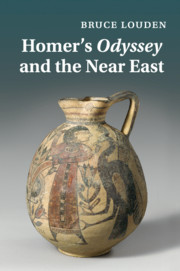Book contents
- Frontmatter
- Contents
- Acknowledgements
- Introduction
- 1 Divine councils and apocalyptic myth
- 2 Theoxeny
- 3 Romance
- 4 Odyssey 4
- 5 Odyssey 5
- 6 Odyssey 6–8, 10–12, 13.1–187; Genesis 28–33; Argonautic myth
- 7 Odysseus and Jonah
- 8 The combat myth
- 9 Catabasis, consultation, and the vision
- 10 Thrinakia and Exodus 32: Odysseus and Moses
- 11 The suitors and the depiction of impious men in wisdom literature
- 12 Odysseus and Jesus
- 13 Contained apocalypse
- Conclusion
- Bibliography
- Index locorum
- Subject index
8 - The combat myth
Polyphêmos and Humbaba
Published online by Cambridge University Press: 04 February 2011
- Frontmatter
- Contents
- Acknowledgements
- Introduction
- 1 Divine councils and apocalyptic myth
- 2 Theoxeny
- 3 Romance
- 4 Odyssey 4
- 5 Odyssey 5
- 6 Odyssey 6–8, 10–12, 13.1–187; Genesis 28–33; Argonautic myth
- 7 Odysseus and Jonah
- 8 The combat myth
- 9 Catabasis, consultation, and the vision
- 10 Thrinakia and Exodus 32: Odysseus and Moses
- 11 The suitors and the depiction of impious men in wisdom literature
- 12 Odysseus and Jesus
- 13 Contained apocalypse
- Conclusion
- Bibliography
- Index locorum
- Subject index
Summary
The Odyssey marks Odysseus as an epic hero in a number of different ways in several different episodes. But perhaps the most important, and traditional, such episode is his defeat of the giant, one-eyed, monster, Polyphêmos, the Cyclops. As de Jong notes (2001: 231),
It shows us Odysseus at his worst…and at his best…It deals with three central issues of the Odyssey: cunning versus force…hospitality…and delayed recognition.
In myth a hero's victory over a powerful monster typically embodies a triumph of good over evil, order over chaos, civilization over nature. To analyze the episode, commentators have tended to overlook ancient Near Eastern parallels, preferring to find a context for it in folktales, in the Iliad, or recently, within the discourse of colonialism. But there are significant drawbacks to all three approaches.
Folktales offer a considerable number of parallels with the Polyphêmos episode, (see Glenn [1971] and Mondi [1983], for instance) to be sure, and often help us understand how the Odyssey may alter a specific motif occurring elsewhere. But almost invariably the folktales used as comparanda differ fundamentally from Homeric epic in their tone or modality, featuring non-heroic characters, lacking gods, or such pivotal motifs as divine wraths. They also date from such later periods that the possibility clearly exists, though it is rarely acknowledged, that the folktales themselves indirectly descend from the Odyssey's account.
A second approach has been to see much of the episode through the lens of the Iliad, as a reaction to episodes in that poem.
- Type
- Chapter
- Information
- Homer's Odyssey and the Near East , pp. 180 - 196Publisher: Cambridge University PressPrint publication year: 2011



